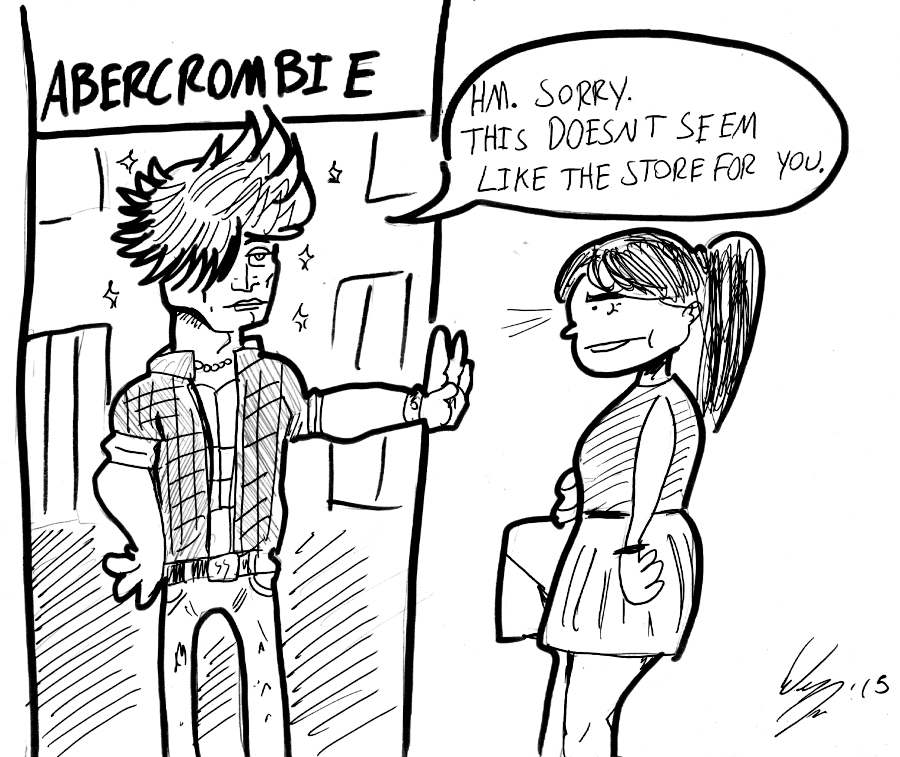Seven years ago, Samantha Elauf had no idea her life was about to change drastically. Little did she know, she was going to revolutionize the future of religious and cultural justice in the retail world.
In 2008, then-17 Elauf interviewed to work for Abercrombie Kids, a children’s clothing store owned by Abercrombie & Fitch in Tulsa, Oklahoma.
She walked into her interview with jeans, a T-shirt and a head scarf, an ordinary outfit for her, considering her Muslim faith. Abercrombie didn’t seem to agree.
As if Abercrombie didn’t have enough problems, let’s just throw religious discrimination into the picture.
Elauf did not get hired for the job simply because her head scarf didn’t comply with Abercrombie’s “Look Policy.”
In Abercrombie’s Look Policy, it’s clearly stated that no employee is allowed to have any extravagant hair styles or colors. It also mentions that the hair must appear natural and must not have any streaks, blocks or chunks of contrasting colors.
In addition, fingernails should not extend more than 1/4 inch beyond the tip of the finger. Although a natural nail is preferred, if polish is worn, it should be natural in color or clear. Any makeup that is worn must be “natural looking” with no bold colors or anything drastic.
As if controlling the length of an employee’s nails and makeup is not enough for the stereotypical, preppy company, it’s also micromanaging employees’ sense of individuality.
The policy states “jewelry must be simple and classic.” If jewelry is the first thing a customer notices on an associate, then that jewelry does not meet this dress code requirement and shouldn’t be worn.
Abercrombie argued they shouldn’t be placed in an awkward situation that causes them to stereotype possible employees based on what they are wearing.
Abercrombie states it is people like Elauf’s responsibility to ask for a religious accommodation for head scarves because they may violate the company’s dress code.
But how is it Elauf’s responsibility to know that her religiously based head covering isn’t in accordance with the Look Policy prior to working for the company?
Well, it’s not her responsibility.
The Equal Employment Opportunity Commission (EEOC) stated it is the responsibility of the employer to bring up something they are questioning in the interview that may potentially conflict with the company’s policies. It’s not the responsibility of the prospective employee, who has no prior knowledge of the company’s internal dress code requirements.
Not only are these dress code rules heavily influencing women’s personal tastes, they are also obliging them to fit a specific American standard of “attractiveness,” which is all inadvertently based on a biased perspective.
But it isn’t just women that Abercrombie has discriminated against: It is also religiously based discrimination, too.
To make this clear, it isn’t Abercrombie doesn’t like the head scarf; it’s that they only like white women.
Because you typically don’t see white women and girls wearing a head scarves.
And when Abercrombie implies such rigid dress code policies, it allows them to hire only white people.
Because Elauf did not fit the “look” for Abercrombie to hire her, they are carelessly reinforcing Abercrombie’s white American standard of beauty, which is completely unacceptable and not appropriate for the ever-changing societal “norms.”
But it gets better. Abercrombie even argued that they would approach someone wearing a baseball cap as violating their Look Policy the same way they said a head scarf is violating the Look Policy.
A yarmulke, hijab and a baseball cap are not the same thing in any way. Abercrombie does not have to accommodate someone wearing a baseball cap. They do have to accommodate an individual wearing a hijab or a yarmulke. No questions asked.
Abercrombie is all about their image. They even stretch so far as to call their employees “models.”
Former Abercrombie CEO Mike Jeffries even had a 40-page manual explaining how employees must act on their Gulfstream jet.
Jeffries also banned the color black from being sold at Abercrombie stores and banned employees from wearing black. He told Salon in 2006, in an effort to make Abercrombie’s clothing as exclusive as possible, they do not carry sizes XL or XXL.
This way, only the cool, skinny white kids can shop at Abercrombie.
Well thanks, Abercrombie, for making teenagers around the world second-guess their sense of self because they are not a specific weight, race or background.
Fortunately, the EEOC sued Abercrombie on behalf of two other Muslim women who also wore head scarves. The company agreed to pay them $71,000 and to revise its Look Policy to allow women to wear head scarves for religious reasons.
Maybe in years to come, an individual’s religious dress won’t be singled out, and people won’t have to worry about society’s discriminatory standards of beauty.
Jen Blate is a 24-year-old sociology junior from Miami, Florida. You can reach her on Twitter @Jblate_TDR.
Opinion: Corporate dress codes hinder individuality, display discrimination
By Jen Blate
March 3, 2015
More to Discover








